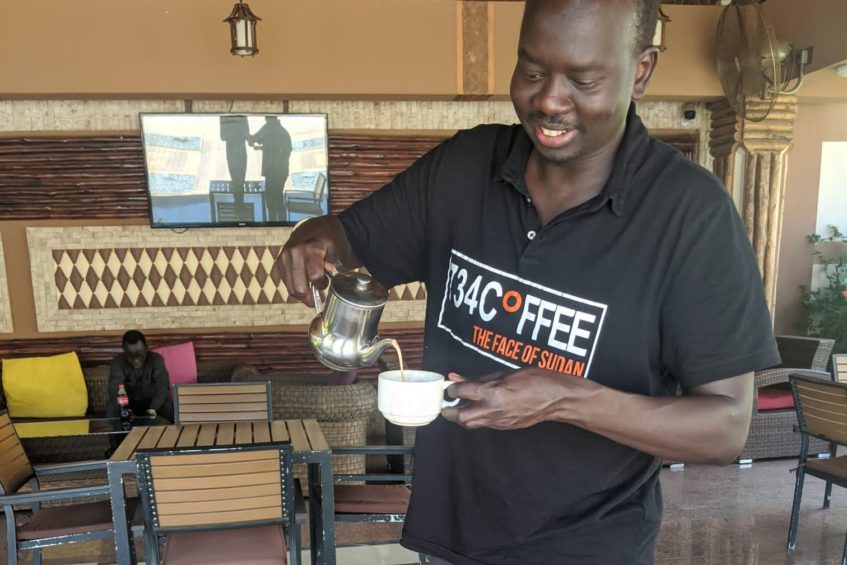You are here: Home | Economy | Featured | National News | Untapped: how former lost boy’s coffee company mirrors S.Sudan to the world

Manyang Reath Kher initiated his exportation company known as the “734 coffee – the face of Sudan” in 2016 in United States/Courtesy photo.
A 33-year-old former lost boy has established a company for the exportation of a local coffee to the world market.
Manyang Reath Kher initiated his exportation company known as the “734 coffee – the face of Sudan” in 2016 in United States.
Over the past years, Manyang’s company purchased about 37 tons of coffee from small-scale farmers in Yei and Buma before exporting to East Africa, Saudi Arabia, Dubai and United states.
“I see that South Sudan has a good land, we have a lot of good coffee but our farmers don’t get opportunity to export this coffee to the world market,” Manyang told Eye Radio in an interview Monday.
“So I said I should start a company that import coffee from South Sudan to all the World, to Mecca and Dubai.”
Manyang and his team locally purchases coffee in South Sudan and processed in Ethiopia before exportation.
At age 3, Manyang became one of the Lost Boys, the name given to the over 20,000 children who were displaced and orphaned by the second Sudan civil war.
For nearly 13 years, Manyang lived in a refugee camp in Gambela along the Ethiopian border, where hunger and fear were part of his daily life.
Manyang’s earliest memories are of war, death and a struggle to survive.
Following hard life in the refugee camp, Manyang dedicated to providing sustainable aid through his organization the Humanity Helping Sudan Project, for refugees who, like him, were displaced by the violence in Sudan.
The initiative has created employment to over 300 coffee farmers in South Sudan and South Sudanese refugee in the neighboring Gambela region of Ethiopia.
“I want to create a job opportunity; I want to create a positive image because everybody think [South] Sudanese are people of war, South Sudanese have no peace, they don’t have anything to export and everybody think that they should all work in the government and get money,” Manyang discloses.
He says his 734 coffee company has the capacity to purchase up to 100 tons of coffee annually, but cited access constraints to coffee producing areas in South Sudan due to poor road infrastructure.
Experts believe that South Sudan has abundant wild Arabica coffee mainly found in areas around Equatoria region.
The 2021 World Population Review report placed Brazil, Vietnam, Colombia, Indonesia, Ethiopia, Honduras, India, Uganda, Mexico, Guatemala on top of the highest rates of coffee production countries in the world.
Education.
When Manyang was 17, he was given a chance to leave the challenging refugee life in the camp and immigrate to the United States, knowing he was one of the lucky ones. He was determined to not take that for granted.
In the U.S, Manyang was enrolled for further studies where he earned his degree in international law at the University of Richmond.
In school, Manyang started Humanity Helping Sudan Project to improve the lives of those still struggling to survive in the camps he left behind mainly in Gambela.
He started 734 Coffee company to help fund Humanity Helping Sudan Project’s programming.
Currently, Humanity Helping Sudan Project runs on-the-ground programs at Gambela that provide fishing and agricultural aid, community gardens, and education programs that reach over 40,000 displaced people.
As the founder and executive director, Manyang leads a team of dedicated individuals who are passionate about finding an end to the refugee crisis and helping improve the lives of those affected by conflict.
He is set to launch a safe drinking water-producing factory known as 734 water in South Sudan in the nearby future.
Support Eye Radio, the first independent radio broadcaster of news, information & entertainment in South Sudan.
Make a monthly or a one off contribution.
Copyright 2024. All rights reserved. Eye Radio is a product of Eye Media Limited.